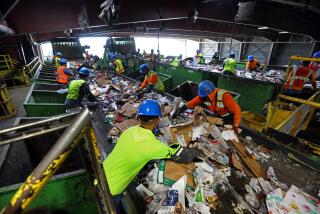That ‘new shower curtain smell’? It’s toxic, study says
- Share via
Vinyl shower curtains sold at major retailers across the country emit toxic chemicals that have been linked to serious health problems, according to a report released Thursday by a national environmental organization.
The curtains contained high concentrations of chemicals that are linked to liver damage as well as damage to the central nervous, respiratory and reproductive systems, said researchers for the Virginia-based Center for Health, Environment & Justice.
The organization commissioned the study about two years ago to determine what caused that “new shower curtain smell” familiar to many consumers.
“This smell can make you feel sick, give you a headache, make you feel nauseous or [cause] other health effects,” said Michael Schade, a coauthor of the report.
Researchers tested the chemical composition of five unopened polyvinyl chloride, or PVC, plastic shower curtains bought from Bed Bath & Beyond, Kmart, Sears, Target and Wal-Mart. One of the curtains was then tested to determine the chemicals it released into the air.
The study found that PVC shower curtains contained high concentrations of phthalates, which have been linked to reproductive effects, and varying concentrations of organotins, which are compounds based on tin and hydrocarbons. One of the curtains tested released measurable quantities of as many as 108 volatile organic compounds into the air, some of which persisted for nearly a month.
Seven of these chemicals -- toluene, ethylbenzene, phenol, methyl isobutyl ketone, xylene, acetophenone and cumene -- have been identified by the Environmental Protection Agency as hazardous air pollutants, said Stephen Lester, the center’s science director and a coauthor of the report.
Potential health effects include developmental damage and harm to the liver and the central nervous, respiratory and reproductive systems, according to the report.
Phthalates and organotins, which are not chemically bonded to the shower curtain, are often added to soften or otherwise enhance the curtain. These additives evaporate or cling to household dust more easily than the chemicals in the curtains themselves, Lester said. Volatile organic compounds also evaporate more easily than the less harmful chemicals, he said.
Vinyl chloride, which is a major building block of PVC, is a known human carcinogen that causes liver cancer, Lester said.
“PVC is just bad from cradle to cradle,” said Martha Dina Arguello, executive director of the Los Angeles chapter of Physicians for Social Responsibility. “It’s a mess when you create, it’s a mess when you get rid of it, and it’s off-gassing when you’re using it.”
Representatives of Target and Sears Holding Co., the parent company of Kmart, said their companies were phasing out curtains that contain PVC. Target said about 90% of the store’s “owned brand” shower curtains offered this spring were made of materials other than PVC. Officials from the other companies were not immediately available for comment Thursday.
The report said that Bed Bath & Beyond had increased the number of PVC-free shower curtains it offered by selling those made of ethylene vinyl acetate and fabrics, but that Wal-Mart did not respond to the organization’s faxes or letters requesting the retailer’s PVC policy.
The American Chemistry Council issued a statement Thursday saying there was “no reliable evidence” that phthalates were harmful or linked to serious health problems, or that they were tied to the new shower curtain smell.
Arguello said studies were still being done on the effects of phthalates and other chemicals on people.
Little information on toxicity is available for 86 of the 108 chemicals detected in the curtains, Lester said.
The EPA has tested vinyl shower curtains and in 2002 said it had found that many of the same chemicals listed in the center’s report.
Lester said the test drew attention to the lack of government regulations or health-based guidelines governing indoor air pollutants.
“The EPA does not regulate indoor air, period,” said Barbara Spark, the indoor air program coordinator for the EPA’s Pacific Southwest region. “We have not been given that authority by the Congress.”
The Center for Health, Environment & Justice sent a letter to 19 major retailers Thursday informing them of the new report and encouraging them to stop selling PVC products.
“Most companies aren’t aware of some of the risks these products entail,” Lester said. “Once they’re informed of this, they’re in many cases ready to make changes and purchase alternative products.”
--






